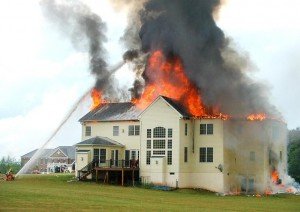Fire is one of the disasters that pose the greatest threats to health and safety. Canadian volunteers respond to at least five disasters every day and majority of these emergencies involve fire. According to statistics, eight people die each week in Canada due to fire with house fires accounting for 73 percent of these deaths.
No one would ever want a fire to break out in their residence, but it can happen. Read further and learn some valuable information that can help save your life and that of your loved ones.
Prevention is key.
Unlike natural disasters and calamities that cannot be prevented, fires are preventable. Here are some tips on how you can prevent fires:

- Keep flammable or combustible items at least three feet away from any source of heat.
- If using candles, never leave them unattended.
- Talk with young kids about the dangers of playing with fires. Keep matches and lighters away from children’s reach.
- Make sure that your electrical system is running properly. Have your electrical wiring checked at least once a year.
- Never attempt to fix or troubleshoot electrical problems, unless you are trained at doing it.
- Avoid using too many electrical appliances at one time to avoid overloading your electrical supply.
- Check your HVAC system or fireplace for debris because they can easily catch fire. It is best to have them cleaned up before winter.
- Make sure your kitchen is fire proof by checking for any gas leaks, clearing fire hazards, and using fire retardant materials.
- Invest in good fire detection and alarm system for your house.
Be prepared.
While emphasis is given on fire prevention, preparedness is the best way to protect yourself and your loved ones in case of a disaster. St Mark James Training recommends that every household have an emergency plan.
- Designate fire exits at each level of your house and make an escape plan.
- Make sure every member of the household knows the fire plan and practice it at least twice a year.
- Build a ready-to-go emergency kit that contains copies of important documents and essential items. Place them in a suitcase or backpack and store in an accessible spot.
- Make your own first aid kit or buy one.
- Invest in smoke alarms on every level of the house. Make sure that they are running properly. Change batteries every month, if needed.
- Know basic first aid. You can attend first aid training courses offered by St Mark James.
What to do in case of fire:
- Follow your fire plan.
- Get out of the house immediately.
- Once out, stay in a safe place. Never return to get something.
- If flames, heat or smoke block the exit, stay inside your room. Close the doors and place a wet towel under the door. Dial 911 to call for help. Open a window and try to get out. If you are trapped in the room, use a flashlight or wave a brightly colored cloth in the window to call for help.
Finally, it is not enough that you know these tips and information. You have to turn knowledge into action. Start your fire preparedness now. Everyone shares the responsibility of protecting themselves and others against the threats of fire.
Learn How to Keep your family safe from house fires (Video)
http://www.youtube.com/watch?v=YJXzmVIWC-c